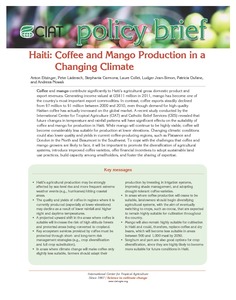Haiti: coffee and mango production in a changing climate
Coffee and mango contribute significantly to Haiti’s agricultural gross domestic product and
export revenues. Generating income valued at US$11 million in 2011, mango has become one of
the country’s most important export commodities. In contrast, coffee exports steadily declined
from $7 million to $1 million between 2000 and 2010, even though demand for high-quality
Haitian coffee has actually increased on the global market. A recent study conducted by the
International Center for Tropical Agriculture (CIAT) and Catholic Relief Services (CRS) revealed that future changes in temperature and rainfall patterns will have significant effects on the suitability of coffee and mango for production in Haiti. While mango will continue to be highly viable, coffee will become considerably less suitable for production at lower elevations. Changing climatic conditions could also lower quality and yields in current coffee-producing regions, such as Plaisance and Dondon in the North and Beaumont in the Southwest. To cope with the challenges that coffee and mango growers are likely to face, it will be important to promote the diversification of agricultural systems, introduce improved coffee varieties, offer financial incentives to adopt sustainable land use practices, build capacity among smallholders, and foster the sharing of expertise.

